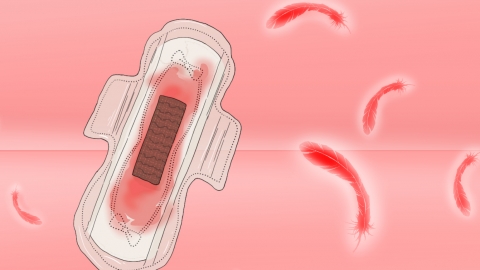What causes light bleeding before and after menstruation?
Light bleeding before or after menstruation may be caused by hormonal fluctuations, emotional stress, luteal phase deficiency, endometrial polyps, cervicitis, and other factors. This can be improved through adjusting sleep patterns, managing emotions, medication, or surgical intervention. If the bleeding lasts a long time or is accompanied by abdominal pain or abnormal discharge, prompt medical attention is necessary.
1. Hormonal fluctuations: Slight fluctuations in estrogen and progesterone levels before and after menstruation can lead to minor endometrial shedding, presenting as spotting. It is recommended to maintain regular sleep habits, avoid staying up late, eat a balanced diet rich in nutrients, and reduce intake of spicy or stimulating foods.
2. Emotional stress: Prolonged anxiety and tension can disrupt the endocrine system, causing menstrual cycle irregularities and light bleeding before or after periods. It is advisable to relieve stress through exercise, listening to music, and maintaining a calm and stable mindset.

3. Luteal phase deficiency: Insufficient progesterone secretion by the corpus luteum prevents complete shedding of the endometrium, leading to light bleeding before or after menstruation, often accompanied by prolonged menstrual periods. Under medical guidance, medications such as progesterone soft capsules, dydrogesterone tablets, or ethinylestradiol cyproterone acetate tablets may be used to improve symptoms.
4. Endometrial polyps: Localized overgrowth of the endometrium forms polyps, which can cause irregular shedding and result in bleeding before or after menstruation, with variable blood loss. Under medical supervision, medications such as levonorgestrel-releasing intrauterine systems, drospirenone-ethinyl estradiol tablets, or desogestrel-ethinyl estradiol tablets may help manage symptoms.
5. Cervicitis: Inflammation of the cervix caused by bacterial or viral infections leads to congestion and fragility of cervical mucosa, making it prone to contact-related or peri-menstrual spotting, often accompanied by increased vaginal discharge. Follow medical advice to use medications such as Baofukang suppositories, metronidazole suppositories, or cefixime dispersible tablets to alleviate symptoms.
Maintain good personal hygiene by frequently changing underwear, avoid sexual intercourse during menstruation, eat a light and easily digestible diet, consume more protein-rich foods, and engage in moderate exercise to strengthen physical health and support reproductive well-being.




